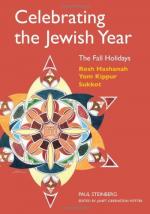|
This section contains 878 words (approx. 3 pages at 300 words per page) |

|
SUKKOT is the Hebrew name for the Jewish autumnal festival, also called the Festival of Booths, or Tabernacles. Sukkot begins on the fifteenth day of the month of Tishri and lasts for seven days, followed by an eighth day called ʿAtseret (possibly meaning "assembly"; see Lv. 23:36, Nm. 29:35). (Outside Israel, ʿAtseret is observed also on the ninth day.) Thus, according to Jewish tradition, there are really two distinct but interconnected festivals: Sukkot proper and Shemini ʿAtseret ("eighth day of ʿAtseret"). The Sukkot rituals are carried out only on Sukkot proper; two are essential. The first is to dwell in booths or tabernacles (sukkot; sg. sukkah) as a reminder of the dwellings in which the Israelites lived at the time of the Exodus from Egypt (Lv. 23:33–44). The second is derived from the biblical verse regarding four plants: lulav (palm branch), etrog (citron), ʿaravot (willows), and hadassim (myrtles) (Lv. 23:40). It is...
|
This section contains 878 words (approx. 3 pages at 300 words per page) |

|


